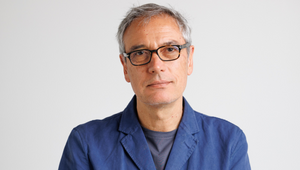
How DM9DDB Tackled Brazil’s Water Crisis with a Hackathon

Brazil is in the midst of an unprecedented water shortage – and water levels in Sao Paulo are at their lowest levels in recorded history. It’s a crisis that’s having a major impact on the whole state’s population and economy – including the advertising industry. With that in mind, DM9DDB decided to borrow a trick from Silicon Valley and hold a hackathon last month to try and drum up some solutions, though the focus was more H2O than hi-tech. The whole agency pulled together to generate 50 ideas. Of these, nine were shortlisted and three were selected as winners and are currently in production. LBB’s Addison Capper caught up with Planning VP Laura Chiavone to find out more about what the water crisis means for Brazil and to talk about the winning ideas.
LBB> Just how bad is the water crisis in Brazil right now?
LC> The water crisis is affecting 3 Brazilian states: São Paulo, Rio de Janeiro and Minas Gerais. São Paulo is in the worst situation between the three of them. Since we’re currently responsible for 31% of Brazil’s GDP, a crisis in São Paulo has a big impact on the whole country. Now let’s focus in the city of São Paulo. The lack of rain combined with a lack of long-term planning by the local government left us in a very alarming situation. Six dams supply the city. They’re all historically low, one of them close to being drought. We’ve just had a very rainy February, but our biggest water supply reservoir, Cantareira, is only 11% full.
LBB> How is it affecting life?
LC> Depend on whose life we’re talking about. People who live in low-income neighbourhoods, usually in the outskirts of the city, are going through very rough times: some of them have spent four days per week without water. People who live in more central neighbourhoods have gone through a couple of hours per day without water. And some of them, the more affluent ones, bought large amounts of water so they didn’t felt the crisis at all. Also, SABESP [the a Brazilian water and waste management company owned by São Paulo state] is applying a fine for people who are consuming more water than usual, and also giving discounts for those who managed to reduce the consumption.
Finally, there is obviously a change in the way we approach water. There used to be a national belief that Brazil was very rich in natural resources. It’s the way the world sees us, after all. As a result, we ended up not treating it with the necessary respect. And when I say “we” I mean citizens and government. So there’s definitely a shift in the way we value water, and hopefully natural resources as a whole. This is the positive by-product of the crisis. And how is it affecting advertising / marketing? I think that, as the whole city, we’re still grasping the news, and trying to understand where we fit in, what are our responsibilities and how can we help as communicators. That’s where Hackathon came into play.
LBB> Where did the idea to stage a hackathon come from?
LC> I don’t believe anything like it had ever been used in Brazil before… It came from a brainstorm in the planning department. We gathered everyone together to think of ways the agency could prepare for the crisis. At this point, the idea was mainly reducing our water consumption. But the discussion came to a point in which we asked ourselves: Why not involve all employees? And why not think about ideas to benefit the whole society, not just the agency? It was a very collaborative project since the beginning.

LBB> Who did you get involved with the hackathon? Who took part?
LC> Everyone was involved. The hackathon mobilized the agency’s 400 staff members. And I believe this is one of the reasons the project worked out so beautifully. The planning department was responsible for putting it together, gathering the material, the experts and thinking about the presentation-brief day. But it was the whole agency that made it happen with their participation and ultimately with great ideas.
LBB> What was the initial reaction to the announcement?
LC> I think we touched in a very sensitive subject for everyone. I mean, people are being affected differently, but still, we’re all being affected by the same problem. A common problem brought everyone together, made us into a team. So the reaction, since the beginning, was very positive.
LBB> On the whole, how do you feel the hackathon went? Were you happy with the result?
LC> It was amazing. Not only because we had a great number of ideas presented - 50 ideas in total – but also because we brought the agency together to think about a problem that mattered to everyone. We know people are eager to work for companies with clear values and a purpose they can identify with – and that’s exactly why the hackathon was such a success. It was a meaningful way to engage everyone in a relevant and purpose-driven project. How did the event work?
LBB> How long did people have to develop ideas?
LC> We made a brief presentation of 15 minutes and then gave them four days to think about ideas, in groups. After four days they all had five minutes to present the idea in front of everyone, including the judges. We selected 9 shortlist ideas out of 50 ideas. Three of them were awarded. Three ideas were awarded R$5,000 to be implemented.
LBB> How was this funded? And who decided the winners?
LC> The ideas were selected by a committee composed of renowned journalists, the agency’s executives, and the company Sharewater, which specializes in reducing the use of water: Alberto Gaspar, Globo Television Network; Paulina Chamorro, Estadão Radio; Diogo Almeida, Sharewater; from DM9DDB, the table included Laura Chiavone, Planning VP, Marco Versolato, Creative VP, Paulo Queiroz and Alcir Gomes Leite, Copresidents.
We ended up selecting the ideas that had real power of impact, and that could influence the conversation about the water crisis.
LBB> What were the winning ideas?
LC> Shower Soundtrack: Songs with instructional lyrics, a gradual tempo and short duration, to play in the bathroom and help people take faster showers. When the song stops, it’s time to turn off the faucet. The idea is to create a series of playlists that feature a range of different genres, such as children’s music, rock, MPB, etc.

Window Collector : The idea behind the window collector is to create a network of low-cost, low-effort windowsill rainwater collectors. To increase the viability of the product, the idea is to standardize installation and make heavy use of colours, making the action very colourful.

Dry Hipster: A good sense of humour was the best incentive for this campaign, which would promote saving water by providing a simple alternative everyone can adopt. The idea is to encourage men not to shave for a determined period of time. This way, less water will be spent every day and everyone will acquire an “engaged hipster” look. After all, beards are in fashion!

LBB> And how are they being implemented now?
LC> They’re in the production phase. The creative team is designing them while we’re looking for partners – most of them our clients, but also artists and media companies. We’re developing a network of players to spread the ideas as much as possible. What else do you feel the advertising industry could and should be doing to help solve the water crisis? As I’ve said, it’s a new scenario for everyone and I think each agency is trying to figure out how to help, according to their own principles. Here at DM9DDB we believe in Influence. This is how we provoke change. So our objective is to Influence people to change their behaviour, by setting an example, and of course by working with our clients so they can be influencers themselves. Our clients have real power to affect change, and I think working together in yet this other challenge is the next step.















